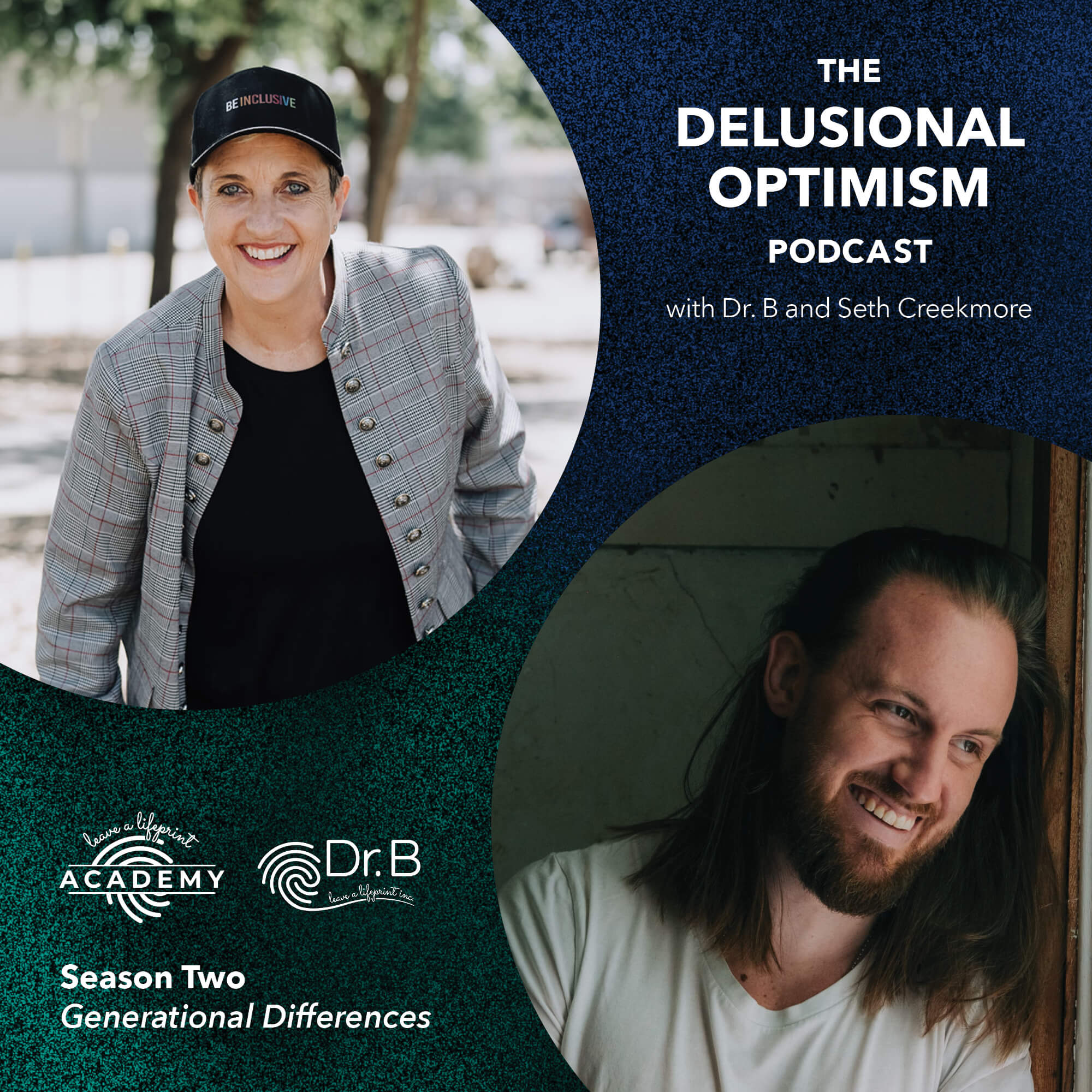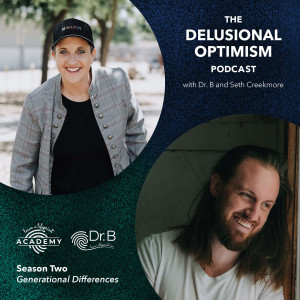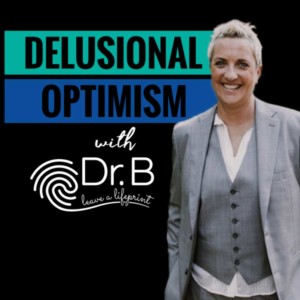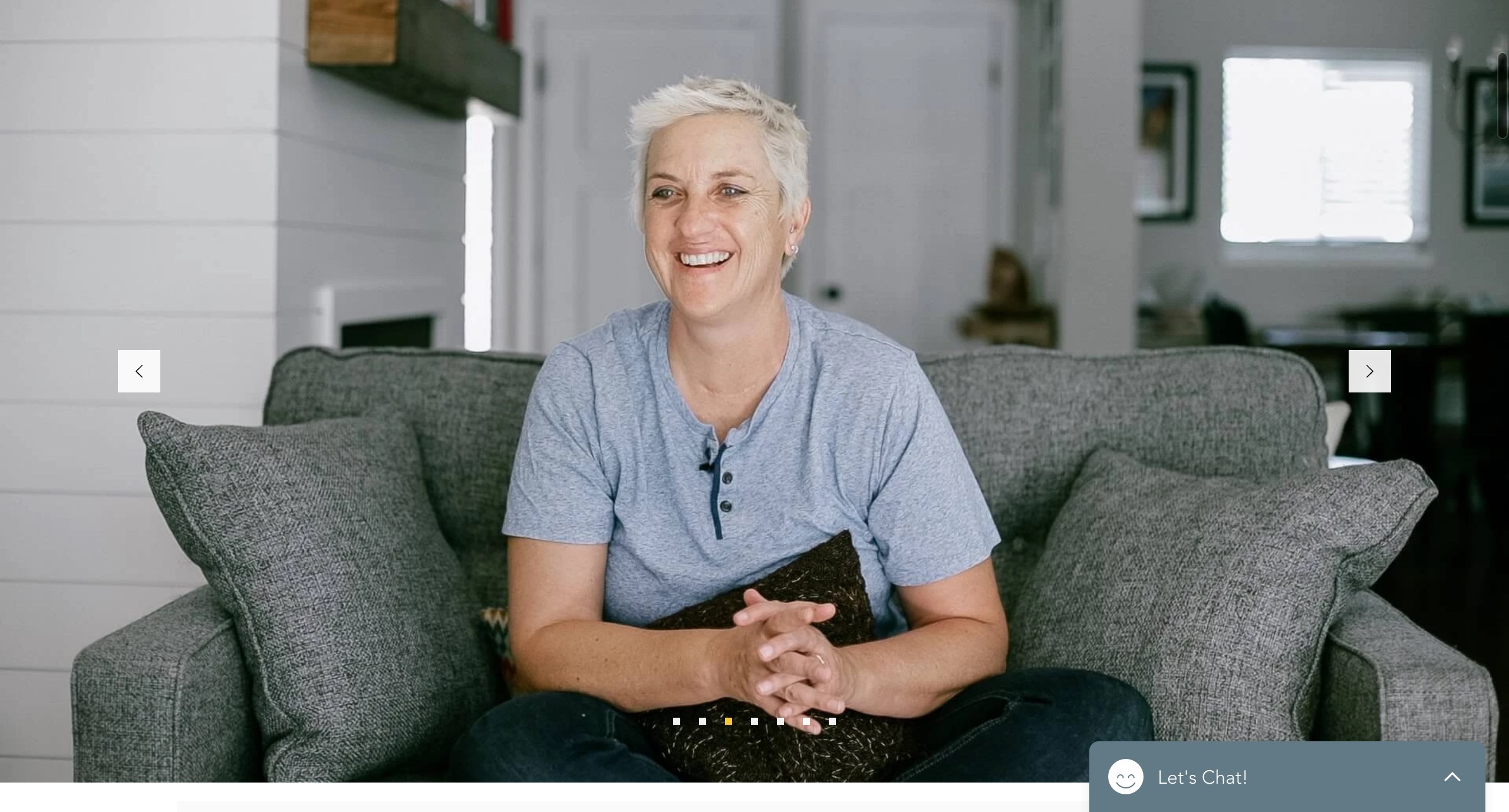
Are you interested in building a more diverse and equitable world? Do you want to learn how to communicate your emotions through a neuropsychological lens? Delusional Optimism with Dr. B is a podcast where we break down complex concepts into easy to understand actionable information. There are five overarching themes in Delusional Optimism; Resilience & Protective Factors Child Development & Parenting Emotions & Neuroscience Diversity & Equity In every episode, we will dig deeper into one or more of these bigger concepts and provide relatable stories and examples of how to approach the world with an informed and OPTIMISTIC mind! The goal is to connect and build a community that is open to learning how the brain works and what we can do to maximize our resilience, build protective factors into our world that support resilience from the beginning of life. Let’s Leave a Lifeprint!
Episodes

Tuesday Sep 29, 2020
Depression and the Intersection of Trauma and ACEs
Tuesday Sep 29, 2020
Tuesday Sep 29, 2020
In this episode of Delusional Optimism, Dr. B talks about depression and how it has roots in early childhood traumatic experiences. She explains the meaning of depression, types, causes, and the importance of supporting relationship-based care for children and families.
Listen in to hear Dr. B’s very personal story that largely explains how the loss of a parent can lead to depression in children of all ages. You will also hear how you can run your depression and not allow it to run you.
“The beginning has a huge impact on the middle and the end and future generations as well and that is the epigenetic contribution.” [39:20]
What You Will Learn:
- [0:32] Intro
- [1:14] The meaning of depression, types of depression, and symptoms of depression.
- [5:43] Why women between 40-53 years are mostly affected by depression.
- [10:05] Why children with ACES are more likely to suffer from depression in their adulthood.
- [17:09] How to understand how past experiences affect the presence of people by bringing the subconscious into the conscious.
- [19:59] The persistent ongoing adverse childhood experience trauma of losing a parent in infancy and how it can lead to depression.
- [35:20] Why depression heavily embedded in childhood experiences is difficult to treat.
- [36:30] The importance of treating depression right now in childhood to build resiliency.
- [39:30] How to build and invest in what we know by supporting relationship-based care, invest in purposeful experiences in children and families, and invest in understanding childhood development.
- [41:15] How to understand your depression by running it- process your experience of depression and run it through the lens of trauma.
- [43:07] Be kind to yourself- put posted notes around the house to remind yourself that you’re important and loved.
- [44:35] Integrate a music list for when you’re feeling bad i.e. particularly when you’re feeling angry or sad which will help you feel better.
- [46:31] The benefits of getting treatment for your depression even at the lower level of it which will help you become better at who you’re and what you’re doing.
Relevant Links:
Email: contact@drbconnections.com

Tuesday Sep 22, 2020
Is Spanking Harmful?
Tuesday Sep 22, 2020
Tuesday Sep 22, 2020
In this episode of Delusional Optimism, Dr. B dives into the controversial topic of spanking and asks the question ‘is spanking harmful?’. She talks about the negative effects of spanking, how it causes adverse childhood experiences, and what you can instead do to be a better parent.
Listen in to learn what research has shown over the years about spanking and the three categories of parents that exist. You will also learn the importance of having an education system that teaches parents about child development.
“The reason that spanking doesn’t work is because it creates pain, it creates fear, and it creates confusion in children.” [24:32]
What You Will Learn:
- [0:32] Intro
- [1:14] How 50 years of research shows spanking is harmful and the reasons that people give for doing it.
- [7:32] How society has normalized spanking across the board making it acceptable.
- [10:23] Research has established that spanked children exhibit aggression towards others and also leads to more anxiety and depression in adults and teenagers.
- [15:46] The three categories of parents- the best parenting strategy is being consistent and predictable to form the same with your children.
- [20:19] The importance of supporting both children and parents especially during these hard times that everyone is together.
- [22:15] Learning to choose the new information and rectify how our parents did things. Learning from our mistakes and make changes based on new information and science.
- [27:47] Building an education system that focuses on resiliency and teaches parents and people about children at different stages and ages.
- [32:00] How to reconnect, repairing, and reconstitute with children when they do something that calls for a spanking.
- [35:42] How to teach children to find their social-emotional strength over their physical strength.
- [37:10] Purchase a child development book and learn.
- [38:22] How to set up a purpose chore system rather than spanking.
Relevant Links:
Email: contact@drbconnections.com
Website: https://www.drbconnections.com/
Books Mentioned:
- Touchpoints: Birth to 3: Your Child's Emotional and Behavioral Development by T. Berry Brazelton
- Raising Good Children by Thomas Lickona
This show is published and produced by the team at Truth Work Media. Truth Work Media creates podcasts and develops content for businesses and clients of all sizes. Truth Work Media helps tell your business's story, and brand your message in an engaging way. Check them out at www.truthworkmedia.com

Tuesday Sep 15, 2020
Dr. B's Coming Out Story
Tuesday Sep 15, 2020
Tuesday Sep 15, 2020
In this episode of Delusional Optimism, Dr. B shares her coming out story. She explains her experience coming out to herself at 39 years, married, and with children.
Listen in to learn the importance of being true to who you are not just for you but also those you love. You will also hear about the importance of having enough strength to bear the difficult consequences of the coming out journey.
“I want every day to be Pride day just like it doesn’t matter if you’re gay or not- you can be proud of who you’re are regardless of everything.” [22:36]
What You Will Learn:
- [0:32] Intro
- [4:27] She explains how she found out she identified as gay later in life and her coming out experience.
- [7:36] The differences and similarities of coming out at a younger and at an older age.
- [15:10] Dr. B reads the emotional letter she wrote to her mother after coming out to her.
- [20:36] How she lost some of the power and privilege she acknowledges she had compared to others coming out.
- [22:48] She reads an emotional coming out letter she wrote to her loving brother.
- [27:53] She talks about her wife and the difficulties of coming out at any age.
Relevant Links:
Email: contact@drbconnections.com
Website: https://www.drbconnections.com/

Thursday Sep 10, 2020
Parenting and Childhood Development
Thursday Sep 10, 2020
Thursday Sep 10, 2020
In this episode of Delusional Optimism, Dr. B dives into the topic of how parenting affects child development. She describes teen parenting scenarios and why access to medical attention should be made easily accessible to teen moms.
Listen in to learn the benefits of making medicine more personal by educating medical professionals on the social determinants of health. You will also learn why you as a parent need to know more about adverse childhood experiences.
“We can really no longer afford to keep mental health and physical or emotional health separate.” [14:51]
What You Will Learn:
- [0:32] Intro
- [2:25] Why teen moms deserve access to proper medical attention like parents of all ages.
- [5:35] Why infants and moms need to be cared for as a unit not individuals in the first few years.
- [8:52] The importance of making medicine more personal. How to incorporate medical professionals and educate them about the social determinants of health caused by early trauma and cultural disparity.
- [15:29] The importance of learning about adverse childhood experiences to be able to advocate for yourself and your community for change.
- [16:28] Why you need to look at parenting differently to end trauma- stop controlling behavior with abusive techniques.
- [21:07] Why as a parent you need to recognize your contribution to your children’s behaviors and find healthy ways to communicate.
Relevant Links:
Email: contact@drbconnections.com
Website: https://www.drbconnections.com/
This show is published and produced by the team at Truth Work Media. Truth Work Media creates podcasts and develops content for businesses and clients of all sizes. Truth Work Media helps tell your business's story, and brand your message in an engaging way. Check them out at www.truthworkmedia.com

Tuesday Sep 08, 2020
Neuroscience of Confirmation Bias
Tuesday Sep 08, 2020
Tuesday Sep 08, 2020
In this episode of Delusional Optimism, Dr. B talks about confirmation bias which is how people disregard new information that contradicts their past beliefs and decisions. She explains how it affects major decisions made by a group of people and have an impact on others.
Listen in to learn why you need to actively fight your confirmation bias and be more open to disconfirming new information. You will also learn about the importance of reconsidering the current American school curriculum due to the changes brought by COVID-19.
“We could specialize and use different kinds of professionals to mentor and teach people things that they need to know when they’re actually working in their field of study or specialization.” [20:08]
What You Will Learn:
- [0:32] Intro
- [1:50] Confirmation bias- when people completely disagree with information that conflicts with their beliefs, choices, or decisions.
- [3:57] Understanding how confirmation bias happens in ignoring facts as long as they’re against what you believe in.
- [8:05] Why we need to actively fight confirmation bias against ourselves and reorganize how decisions affecting others are made.
- [9:54] How the brain fails us for failing to use contradictory information to what is disconfirming- new information.
- [14:55] How COVID-19 has permanently changed the world in many sectors.
- [16:24] The importance of revisiting our school curriculum to a baseline education that allows people to be in tune with specialization.
- [22:42] The similarities between traditionalists and generation Z and how they’re going to recreate our future during and after the COVID-19.
- [24:10] The statistics of people’s views on Coronavirus and what it means in terms of confirmation bias.
Relevant Links:
Email: contact@drbconnections.com
Website: https://www.drbconnections.com/

Thursday Sep 03, 2020
How Brain Chemistry Works with Brain Structure
Thursday Sep 03, 2020
Thursday Sep 03, 2020
In this episode of Delusional Optimism, Dr. B talks about brain chemical reactions and how they affect how the brain functions. She explains the functions of the four chemicals dopamine, endorphins, oxytocin, and serotonin, how they’re induced, and how they affect your daily life.
Listen in to learn how your body can manage extreme pain on its own. You will also learn the importance of teaching your kids about the brain chemicals to feel good and how they can control them to avoid mental issues.
“The cortex is part of the brain that is negotiating connections past and present so we understand what’s going on.” [10:24]
What You Will Learn:
- [0:32] Intro
- [8:06] How the cortex looks for patterns from the past and the present to make things make sense.
- [11:17] How to get a dopamine kick for doing something purposeful and completing tasks. How to encourage children to do things to feel good.
- [14:55] How oxytocin is our social bonding alliance- releasing oxytocin while connecting with others.
- [17:38] How endorphins help the body ignore pain- helping the body to survive the trauma by managing physical pain.
- [21:11] How serotonin helps you feel socially competent- the impact of serotonin in your social life and its role in mental health issues.
- [23:35] The importance of understanding how brain chemicals affect our emotional wellbeing and how we can control it through practicing it and being consciously aware of it.
- [27:20] Understanding the feeling of jittery, how it’s related to anxiety, and how to get a handle on it.
Relevant Links:
Email: contact@drbconnections.com
Website: https://www.drbconnections.com/

Tuesday Sep 01, 2020
Tuesday Sep 01, 2020
In this episode of Delusional Optimism, Dr. B dives deep into the meaning of the polyvagal system and its relations to past traumas. She explains the hierarchy connection of the body and mind and how they work separately and together.
Listen in to learn about the dorsal vagus nerve and the ventral vagal nerve systems and their functions in your body and brain. You will also hear how you can learn and grow from the polyvagal system and optimism.
“We have to find healthy ways to connect with other people to make the world a better place.” [28:46]
What You Will Learn:
- [0:32] Intro
- [2:28] Why how we react happens deep inside of our body and mind. We process the danger in the environment before being consciously aware of it.
- [5:41] How our early experiences shape our perception and perspective.
- [7:45] Polyvagal system explained! How the polyvagal system is attached deep into our bodies and mind.
- [11:02] The hierarchy that connects the mind and the body and how it works.
- [12:39] The social engagement system- it delivers information into our facial muscles that help read whether you’re in a safely connected situation or not.
- [13:44] The systematic nervous system- when you can feel danger but it is unknown.
- [14:50] The parasympathetic dorsal vagal system- this is when you’re presented with a life-threatening or a feeling like life-threatening.
- [20:03] Why both the dorsal vagus nerve (the immobilizer) and the ventral vagal nerve are important and none can work without the other. Understanding both their functions in your body.
- [26:32] Learning how to be kind to yourself over how you responded negatively to a situation, understanding why you did it, and working towards responding better.
- [28:32] How to find healthy ways to connect with other people because nobody wants to be alone.
- [29:24] How to be aware of a present trauma to grow and change from it through optimism.
- [33:31] Learn to ask questions when someone throws you off plus finding a polyvagal partner to help you grow.
- [35:37] The importance of keeping a reflective journal that allows you to reflect on the trauma differently.
- [37:35] Why you should bring a group of different types of people together and the differences will surprise you.
Relevant Links:
Email: contact@drbconnections.com
Website: https://www.drbconnections.com/

Thursday Aug 20, 2020
Living with Uncertainty
Thursday Aug 20, 2020
Thursday Aug 20, 2020
In this episode of Delusional Optimism, Dr. B dives into the topic of anxiety brought by life’s uncertainties which is at this moment is COVID-19 for all of us. She explains why you may be having conflicting thoughts about the whole situation and how the brain is functioning to show you how the world is working to keep you alive.
Listen in to learn how you can create a semi-new reality about the future of COVID-19 by being optimistic. You will also learn the importance of creating meaningful conversations with your loved ones on how to manage each other’s safety.
“The uncertainty is almost or worse than just the certainty of something that is potentially negative.” [29:22]
What You Will Learn:
- [0:32] Intro
- [4:11] Understanding the concept of getting comfortable feeling uncomfortable for self-growth and development.
- [7:59] The conflicting thoughts and information on the danger of COVID-19.
- [15:27] How the brain is looking for patterns to give us insights on how the world works and keep us alive.
- [18:18] How to maximize your environment for your survival and why the anxiety of not knowing what to expect creates more uncertainty than knowing what to expect.
- [22:29] How to be delusional optimistic about the future of COVID-19 by creating a semi-new reality that will settle your panic level uncertainty.
- [27:40] How to reduce the level of uncertainty about COVID-19 by having meaningful conversations around your safety with your loved ones.
Relevant Links:
Email: contact@drbconnections.com
Website: https://www.drbconnections.com/

Tuesday Aug 18, 2020
Adverse Childhood Experiences (Aces)
Tuesday Aug 18, 2020
Tuesday Aug 18, 2020
In this episode of Delusional Optimism, Dr. B talks about the effects of adverse childhood experiences like physical and emotional abuse on adult lives. She dives deep into an ACEs study finding that was conducted on 2300 people to determine the cause of their trauma.
Listen in to learn the relationship between drug addiction and trauma and why the former is caused by the latter. You will also learn the importance of telling your traumatic story in any form to start the process of healing.
“Drugs are an attempt at solving the problem but they’re not the problem.” [19:51]
What You Will Learn:
- [0:31] Intro
- [1:13] How your adverse childhood experiences can set you up for social, emotional, and cognitive impairments.
- [7:24] How one experience can change your life positively or negatively.
- [8:53] The effects of childhood physical and emotional abuse and neglect in adulthood.
- [16:06] The adverse childhood experiences study summary findings.
- [17:50] Why drug addiction is caused by unresolved, untreated trauma and not pharmaceutical industry and its profits.
- [21:50] Why early relationships are the most important thing in a child’s life.
- [23:38] Resiliency vs trauma even in the same family.
- [25:03] The importance of having trusting and connected relationships to live your life fully.
- [25:50] The importance of telling your story to disperse trauma and heal.
Relevant Links:
Email: contact@drbconnections.com
Website: https://www.drbconnections.com/

Wednesday Aug 12, 2020
Just Say, "NO" to Social Distancing. Words Matter!
Wednesday Aug 12, 2020
Wednesday Aug 12, 2020
In this episode of Delusional Optimism, Dr. B dives deep into the long-term effects of emotional trauma which is brought by negative words. She explains how words are logged in and wired into babies from their fetal stage.
Listen in to learn the negative generational impact of the ‘social distancing’ phrase and how you can change that by using the right words. You will also learn the importance of quiet time for you and your little ones in creating and filtering ideas.
“We need to stay socially and emotionally connected more than ever.” [18:03]
What You Will Learn:
- [1:10] Why words are powerful in how things happen in our lives. The harmful and long-term effects of emotional trauma.
- [4:52] How negative self-talk can lead to generational anxiety and stress.
- [7:09] Stop social distancing, physical distance instead! The stress and anxiety brought by using the ‘social distancing’ phrase.
- [14:58] How words are logged in, recorded and wired into the brain from the fetal stage of a baby.
- [17:59] How an entire generation is going to be traumatized due to the use of a ‘social distancing’ phrase. How to change the brain chemistry of people by using the right words.
- [21:50] The preverbal and verbal period of time- how to make the connection between the two to start healing.
- [23:15] The importance of sitting in the quiet to filter your ideas and feelings about it.
Relevant Links:
Email: contact@drbconnections.com
Website: https://www.drbconnections.com/
